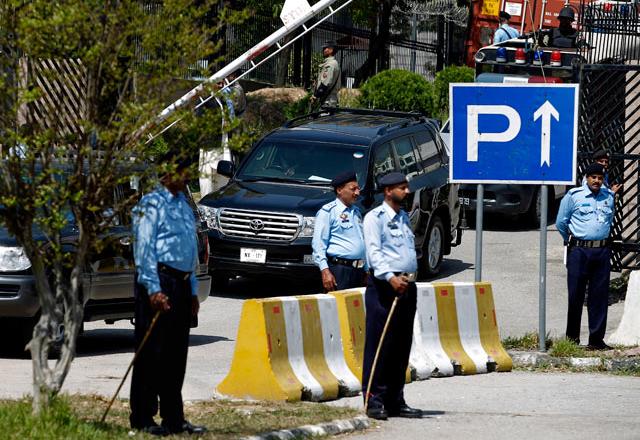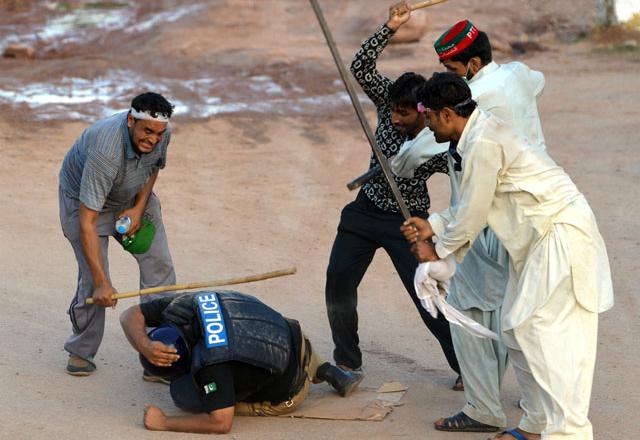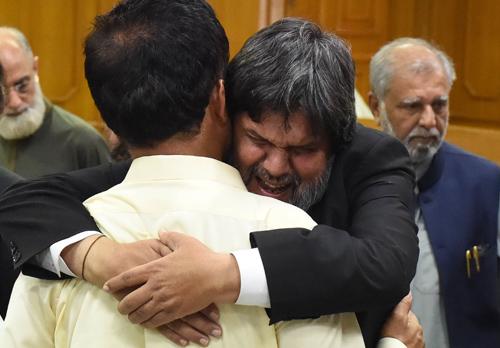You are here
Pakistan court indicts ex-president Musharraf for treason
By AFP - Mar 31,2014 - Last updated at Mar 31,2014

ISLAMABAD (AFP) –– A Pakistani court Monday indicted former military ruler Pervez Musharraf for treason, a landmark move in a case seen as a test of civilian authority in a country long dominated by the military.
Tahira Safdar, one of three judges hearing the case in a special court, read out five charges relating to Musharraf's 2007 imposition of emergency rule, with the ex-president pleading "not guilty" to each of them.
Musharraf, who had earlier arrived at the court in a convoy of SUVs with over 2,000 security personnel deployed along his route, then turned to address the judges.
"I honour this court and prosecution, I strongly believe in law and don't have ego problems, and I have appeared in court 16 times in this year in Karachi, Islamabad and Rawalpindi," the 70-year-old, who ruled Pakistan from 1999 to 2008, said.
Appearing fit and confident, he made an emotional speech highlighting the country's achievements under his tenure.
"I am being called a traitor, I have been chief of army staff for nine years and I have served this army for 45 years. I have fought two wars and it is 'treason'?"
"I am not a traitor. For me traitors are those who loot public money and empty the treasury," he added.
Musharraf's defence team requested the court adjourn for eight weeks to allow them to prepare, and repeated a call for the retired general to be allowed to visit his ailing mother, who is in her nineties, in the UAE.
"He has come voluntarily to the court and he has pleaded not guilty. He will come back voluntarily," lawyer Farogh Naseem said.
The court is likely to respond this request in its written order later Monday.
- 'Acted on advice' -
After the hearing, chief prosecutor Akram Sheikh said Musharraf's main defence rested in the claim that he acted on the advice of then-prime minister Shaukat Aziz and the cabinet when suspending the constitution.
"He has taken the defence that he did not take these steps independently," Sheikh said.
"On this I have submitted before the court that it is now for him to prove that he did this on the advice of the prime minister and the cabinet," he added.
Musharraf declared a state of emergency in November 2007, shortly before the Supreme Court was due to rule on the legality of his re-election as president a month earlier while he was also the army chief.
He then arrested and sacked the country's top judges, including the chief justice, who challenged his decision.
Facing impeachment following democratic elections in 2008, Musharraf resigned as president, going into self-imposed exile in Dubai.
He returned to Pakistan in March last year on an ill-fated mission to run in the general election.
Almost as soon as he landed he was barred from contesting the vote and hit with a barrage of legal cases, including on his decision to raid a radical mosque in Islamabad, the killing of a rebel leader in Baluchistan and the death of ex-prime minister Benazir Bhutto.
Related Articles
Pakistan’s government was Thursday ordered to lift a travel ban on former military ruler Pervez Musharraf in a court decision that could draw a line under a raft of legal troubles.
Pakistani soldiers and paramilitary forces secured the state television headquarters in Islamabad on Monday after a crowd of anti-government protesters stormed the building, and took the channel off the air.
QUETTA, Pakistan — Pakistani lawyer Ataullah Lango had just arrived at the Civil Hospital in the southwestern city of Quetta to mourn

















